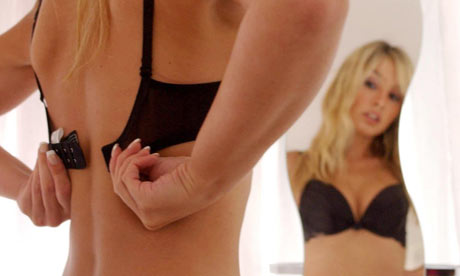
A prominent British plastic surgeon has been threatened with a libel action by the manufacturer of a cosmetic cream because she publicly questioned, in a newspaper article, whether it worked as the company claimed.
Rodial Limited claims that its £125 Boob Job cream can increase a woman's breast size, if applied regularly, by up to 8.4%. According to the company's website, Boob Job works "with your natural fat cells. As the fat cells move around the body after eating, boob job 'blocks' the fat into the area where the product has been applied, so the bust and décolleté areas. You will see a gradual increase in cup size within 56 days as well as gaining an instant lifting and firming effect."
Dalia Nield of The London Clinic was quoted in the Daily Mail as saying it was "highly unlikely" that the Boob Job cream could do what it claimed. She said that the company had not provided details of the tests carried out on the cream and that if its claims on moving fat cells were true, then the product could be dangerous.
Nield's solicitor, Robert Dougans of Bryan Cave LLP, said that subsequent correspondence from Rodial's solicitors can only be interpreted as a threat of potential libel action against his client. Dougans, who also acted for science writer Simon Singh in his libel battle against the British Chiropractic Association, said that Nield is now in the same position as Singh was at the start of his action against the BCA. "She [and Simon] were expressing [their] honest opinion on a matter of public importance on a matter they were very qualified to talk about. Simon because he had just written a book on the subject and written in great detail on whether chiropractic works and Mrs Nield because she's one of the country's specialists on breast surgery."
Nield said that, as a surgeon, she was well aware of the necessity for claims on medical products to be based upon rigorous scientific testing, as well as the possible dangers which can result from treatments. "It is my duty to speak out when products making these claims are not backed up by evidence. The safety and health of people could be at risk if I cannot do this."
Former Liberal Democrat MP Evan Harris, who speaks on behalf of the Libel Reform Campaign, said: "This sort of libel threat is an unacceptable form of bullying of clinicians and researchers on a matter where the public interest demands the maximum possible scientific and media debate, and it is why radical libel reform is both vital and urgent. The cases we hear about - where doctors and scientists, and the newspaper or journal, stand up to the threat of costly and uncertain court action - are only the tip of the iceberg because most will simply be forced to retreat in the face of a libel suit."
Nield's is the latest in a series of cases highlighted by the Libel Reform Campaign of scientists and medics being sued by companies for expressing their expert opinions. Singh was sued for pointing out the lack of evidence for the efficacy of chiropractic in the treatment of some infant disorders. Consultant cardiologist Peter Wilmshurst is being sued by NMT Medical for speaking about data from a clinical trial of a medical device. Guardian columnist and medical doctor, Ben Goldacre, was sued by a vitamin manufacturer for questioning claims that its products could treat HIV/Aids.
Singh said Nield's case was "yet another libel threat that demonstrates that the government needs to act urgently and radically to reform our libel law, which clearly silences critics on matters of public interest. In the last month, I have come across six new libel threats, which in turn means that the public only hears half the story."
The government has promised action to introduce a stronger public interest defence for libel in its Defamation Bill, due to be published early in 2011. This could protect expert debate about science, evidence and healthcare from England's current libel laws.
Fazel Fatah, consultant plastic surgeon and president of the British Association of Aesthetic Plastic Surgeons, said that doctors have a duty of care to patients and the public at large. "[They] should be able to give their considered opinions and show scepticism, without fear of a libel suit, when concerns are raised regarding unsubstantiated claims about products or procedures that are sold directly to the public without available and verified evidence of efficacy and safety."

